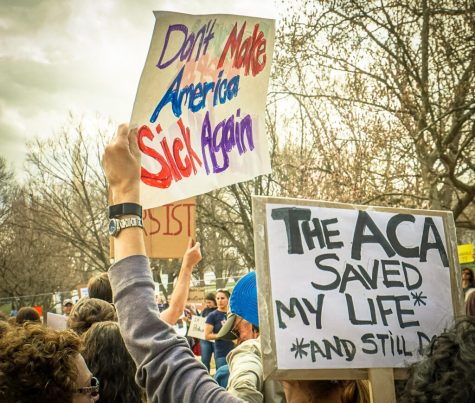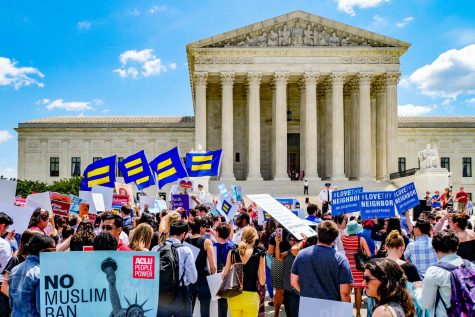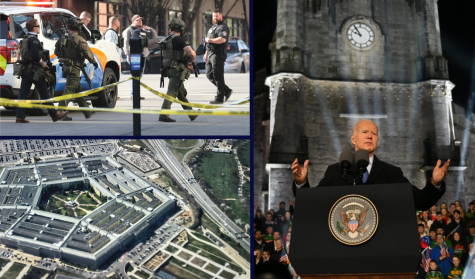SCOTUS Roundup
What Cases May Impact Civil Rights?
With the recent confirmation of Supreme Court Justice Amy Coney Barrett, the media has begun to question the impact that Barrett’s confirmation could have on court decisions and society at large. Barrett has already publicly voiced her opinion on abortion, and many people are wondering what her appointment will mean for that and other key civil rights issues. Although refusing to directly answer specific questions asked by Senate members in her confirmation, Barrett has expressed desire to overturn Roe v Wade in the past, as well as to change policies on “paid leave, affordable childcare, equal pay, voting rights, racial justice, and LGBTQ+ equality,” according to The Guardian. Here are summaries of several recent and upcoming cases that may have a powerful impact on the future course of our democracy.
Affordable Care Act

Rally in Support of the Affordable Care Act, at The White House, Washington, DC USA
Although many Republican politicians and government officials still support overturning the Affordable Care Act set in place by the Obama administration, it is not being invalidated anytime soon by the Supreme Court. The oral argument was November 10th which focused on striking down the individual mandate that initially required most Americans to obtain insurance or pay a penalty within the Affordable Care Act. In 2017, Congress zeroed out this mandate, but after the spread of Obama’s healthcare reform, opponents sought to completely eliminate this policy by having the whole act deemed unconstitutional.
However, contrary to many democrats’ expectations, oral questioning seemed to point to a favorable outcome. Conservative Justice Brett Kavanaugh and Chief Justice John Roberts “suggested that it wasn’t the Supreme Court’s role to invalidate the entire sprawling, 900-page Affordable Care Act, even if one or more provisions are deemed unconstitutional, signaling that key parts of Obamacare will survive the latest court challenge,” according to CNN. This outcome would allow the Affordable Care Act to still stand although one of its central policies no longer does.
Sharonell Fulton, et al. v. City of Philadelphia, Pennsylvania, et al.
The oral argument for a case originally taken to court in 2018, Fulton v City of Philadelphia, was scheduled in the Supreme Court docket No.10-123 on November 4. This case, having not yet been decided yet, would limit the resources available for specific individuals to adopt a child, a sometimes necessary and life-changing event. It currently prohibits “private agencies that receive taxpayer-funding to provide government services — such as foster care providers, food banks, homeless shelters, and more” from denying services to people who are LGBTQ, Jewish, Muslim, or Mormon according to the ACLU. While the adjudication is still pending, the overturning of this case would discriminate against communities within our country, which contradicts the fundamental policies on which our nation was built upon.
The case turns on whether an agency that accepts tax funding to recruit foster parents can deny access to some same sex couples, citing a religious objection. The lack of the enforcement of the Free Exercise clause was brought into the argument when respondents, rather than defending Fulton, asked “the Court for a newly minted constitutional standard that’s even less protective of religious exercise. That approach has no basis in the text, history, or traditions of the Free Exercise Clause.” The court may be in a position of privileging one right — religious freedom, over and another, equality under the law.
Trump v. New York
Trump V. New York is a case scheduled for oral argument by the Supreme Court of the United States on November 30, 2020, during the court’s October 2020-2021 term. The President had ordered that undocumented immigrants be excluded from the 2020 census, a move which has not been done before, and which some constitutional scholars believe is unconstitutional. This case was opened with a memorandum issued by President Trump to the U.S. Secretary of Commerce after the 2020 Census. The memorandum stated that his policy that excluded “individuals living unlawfully in the U.S. from the census apportionment base” was not being properly enforced. Trump’s memorandum pushed the census to not count the undocumented people, and the lawsuit seeks to force the memorandum to be obeyed.

The district court ruled in favor of the coalition tha opposed the memorandum, and claimed that President Trump exceeded his authority. The government to appeal to the U.S. Supreme Court, according to Ballotpedia. A more definite verdict will be decided after the hearing this week.
Although many are concerned about the majority Republican Supreme Court, the election of President Elect Joe Biden has the potential to change the future of the country. The outcome of these cases are crucial in determining specific events in the lives of many Americans.

A senior at the Albuquerque Academy, Stella Hudson has been writing for The Advocate since the beginning of her sophomore year. Her work centers mostly...













Stephanie LIpkowitz • Nov 25, 2020 at 9:50 am
Excellent, clear summary of these key cases, Stella. Very helpful context you have provided.
Carson Morris • Nov 24, 2020 at 3:23 pm
Thanks for this excellent piece, Stella!